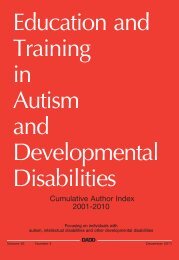Download the Journal (PDF) - Division on Autism and ...
Download the Journal (PDF) - Division on Autism and ...
Download the Journal (PDF) - Division on Autism and ...
Create successful ePaper yourself
Turn your PDF publications into a flip-book with our unique Google optimized e-Paper software.
Effects of a Reciprocal Questi<strong>on</strong>ing Interventi<strong>on</strong> <strong>on</strong> <str<strong>on</strong>g>the</str<strong>on</strong>g><br />
Questi<strong>on</strong> Generati<strong>on</strong> <strong>and</strong> Resp<strong>on</strong>ding of Children with<br />
<strong>Autism</strong> Spectrum Disorder<br />
Kelly Whal<strong>on</strong><br />
The College of William <strong>and</strong> Mary<br />
Mary Frances Hanline<br />
Florida State University<br />
Abstract: A multiple baseline design across participants was used to investigate <str<strong>on</strong>g>the</str<strong>on</strong>g> effects of reciprocal<br />
questi<strong>on</strong>ing strategy instructi<strong>on</strong> delivered in cooperative pairs <strong>on</strong> <str<strong>on</strong>g>the</str<strong>on</strong>g> questi<strong>on</strong> generati<strong>on</strong> <strong>and</strong> resp<strong>on</strong>ding of<br />
children with autism spectrum disorder. Three children with autism spectrum disorder <strong>and</strong> nine general<br />
educati<strong>on</strong> peers participated in <str<strong>on</strong>g>the</str<strong>on</strong>g> study. Following interventi<strong>on</strong>, children with autism increased frequency of<br />
questi<strong>on</strong> generati<strong>on</strong> <strong>and</strong> resp<strong>on</strong>ding using a story map framework. Social validity data indicated children with<br />
autism spectrum disorder <strong>and</strong> <str<strong>on</strong>g>the</str<strong>on</strong>g>ir general educati<strong>on</strong> peers found <str<strong>on</strong>g>the</str<strong>on</strong>g> interventi<strong>on</strong> helpful, <strong>and</strong> parents<br />
perceived a change in <str<strong>on</strong>g>the</str<strong>on</strong>g>ir child’s reading <strong>and</strong> language skills.<br />
“Learning to read builds <strong>on</strong> cognitive, linguistic,<br />
<strong>and</strong> social skills that have developed from<br />
<str<strong>on</strong>g>the</str<strong>on</strong>g> earliest age” (Rayner, Foorman, Perfetti,<br />
Pesetsky, & Seidenberg, 2001, p. 34). Basic to<br />
reading development is a child’s proficiency<br />
in language (Rayner et al.). For children with<br />
autism spectrum disorder (ASD), however,<br />
<str<strong>on</strong>g>the</str<strong>on</strong>g> reliance <strong>on</strong> language development to facilitate<br />
reading skills is problematic, as children<br />
with ASD typically experience difficulty<br />
in acquiring <str<strong>on</strong>g>the</str<strong>on</strong>g> linguistic skills needed for<br />
effective reading (Myles et al., 2002; Norbury<br />
& Bishop, 2002). Because of <str<strong>on</strong>g>the</str<strong>on</strong>g> variability in<br />
acquisiti<strong>on</strong> of cognitive, linguistic <strong>and</strong> social<br />
skills, it is likely that learning to read will<br />
present a range of challenges for children<br />
with ASD.<br />
In comparis<strong>on</strong> to typically developing<br />
peers, children with autism generally acquire<br />
speech late, <strong>and</strong> “a substantial minority” fail to<br />
develop fluent speech by adolescence or<br />
adulthood (Lord & Paul, 1997, p. 204). Children<br />
with ASD that develop speech, typically<br />
dem<strong>on</strong>strate good mechanics of language<br />
Corresp<strong>on</strong>dence c<strong>on</strong>cerning this article should<br />
be addressed to Kelly Whal<strong>on</strong>, The College of William<br />
<strong>and</strong> Mary, P.O. Box 8795, Williamsburg, VA<br />
23187-8795. Email: kjwhal@wm.edu<br />
Educati<strong>on</strong> <strong>and</strong> Training in Developmental Disabilities, 2008, 43(3), 367–387<br />
© <str<strong>on</strong>g>Divisi<strong>on</strong></str<strong>on</strong>g> <strong>on</strong> Developmental Disabilities<br />
(Minshew, Goldstein, & Siegel, 1995) with accurate<br />
articulati<strong>on</strong>, <strong>and</strong> ph<strong>on</strong>ological development<br />
similar to that of <str<strong>on</strong>g>the</str<strong>on</strong>g>ir general educati<strong>on</strong><br />
peers (Tager-Flusberg, Paul, & Lord, 2005),<br />
yet have difficulty with more complex syntax<br />
<strong>and</strong> semantics as well as pragmatic aspects of<br />
language (Tager-Flusberg & Joesph, 2003).<br />
Some children with ASD appear to <strong>on</strong>ly have<br />
difficulties with social aspects of language<br />
ra<str<strong>on</strong>g>the</str<strong>on</strong>g>r than syntactic or semantic difficulties,<br />
<strong>and</strong> o<str<strong>on</strong>g>the</str<strong>on</strong>g>rs may make gains in social aspects of<br />
language but c<strong>on</strong>tinue to have limited spoken<br />
language (Tager-Flusberg et al.).<br />
The scale of difficulties children with ASD<br />
experience with language can potentially impact<br />
<str<strong>on</strong>g>the</str<strong>on</strong>g> reading process. Evidence suggests<br />
that we can <strong>on</strong>ly comprehend text to <str<strong>on</strong>g>the</str<strong>on</strong>g> degree<br />
we comprehend language (Rayner et al.,<br />
2001). Although many children with ASD can<br />
develop average or better decoding skills,<br />
<str<strong>on</strong>g>the</str<strong>on</strong>g>se decoding strengths generally accompany<br />
problems with reading comprehensi<strong>on</strong><br />
(Frith, 2003; Mayes & Calho<strong>on</strong>, 2003a; 2003b;<br />
Calho<strong>on</strong>, 2001; Lord & Paul, 1997; Minshew,<br />
Goldstein, Taylor, & Seigel, 1994; Nati<strong>on</strong>,<br />
Clarke, Wright, & Williams, 2006); however,<br />
extreme variability has been noted in reading<br />
development across <str<strong>on</strong>g>the</str<strong>on</strong>g> autism spectrum (Nati<strong>on</strong><br />
et al., 2006). Despite variability in reading<br />
Reciprocal Questi<strong>on</strong>ing / 367
















